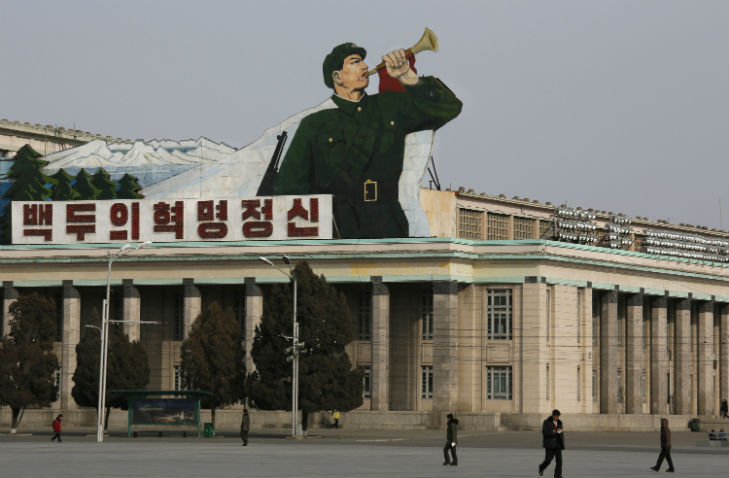GRAPHIC CONTENT WARNING: This post contains details and images that some readers may find disturbing. Discretion is advised.

It should come as a surprise to almost no one in the international community that North Korea‘s Supreme Leader is accused of violating human rights on a massive scale.
But testimonies in a 372-page United Nations report on human rights in the Democratic People’s Republic of Korea are harrowing.
READ MORE: Kim Jong Un warned he could be accountable for ‘crimes against humanity’
The investigation looked at years of violations – from the country’s founding leader Kim Il Sung, his son Kim Jong Il and grandson and current ruler Kim Jong Un.
The UN panel alleges “gross human rights violations” such as rape, forced abortions, enslavement and murder. The commission indicated these crimes, committed as a “massive, frequent, large scale action,” constitute crimes against humanity.
Here are some of the violations the North Korean government is said to be responsible for:
Forced abortion, infanticide and sexual violence
According to the commission’s findings, North Korean women who became pregnant after having fled to China have been subjected to forced abortions once repatriated to DPRK.
While forced abortions are also said to be carried out on other women held in detention, the commission reported the abortions performed on repatriated women are an act of “hostility towards Korean women who have had sexual intercourse with Chinese men and become pregnant.”
“The perpetrators of forced abortion and infanticide appear to be driven by official ideology that emphasizes the importance of maintaining the purity of the Korean race at all costs,” the commission wrote.
Not all women were subjected to forced abortions. Others saw their babies killed shortly after birth. One witness testified to the commission regarding a woman who became pregnant after a guard raped her. She carried the baby to term while detained in a prison camp punishment block but the infant “was thrown in the feeding bowl for the dogs.”
The same witness said he was aware of a girl who was punished and tortured after being raped. He explained the girl “was tortured by pressing a burning hot stove hook on her breast,” and was later forced into hard labour in a coal mine. He said she lost eventually her legs in an accident at the site.
Torture
North Korean interrogators are said to have beaten prisoners arrested for “unauthorized travel to China or other politically sensitive conduct.”
One torture victim told the commission he was beaten with a wooden club until he could “no longer scream” and he suffered enduring injuries to his kidneys as a result.
Another torture victim, Mr, Kim Kwang-il, said police subjected to him to what was called the “pigeon torture” position and beat his chest until he threw up blood. He said he wound up confessing to crimes he did not commit. He submitted these drawings of torture methods to the commission.

Not all of the victims were adults. The commission spoke with 16-year-old Kim Hyuk, a former prisoner who was forcibly repatriated from neighbouring China as a boy. He said he was also put through pigeon torture and was kept at the interrogation centre until he was 17 and could be tried as an adult.
Starvation
North Korean citizens are already faced with food shortages and famine, but the commission stated North Korean government policies dating to the country’s birth following the Korean War, have led to mass starvation.
“The deprivation of access to food, calculated to bring about the destruction of part of a population, amounts to extermination.”
A report published in 1999 estimated 3.5 million North Koreans starved to death between 1995 and 1999, when deaths related to starvation reached their highest levels.
Through witness testimony, the commission found evidence that starvation was also used as a form of torture and extermination in its prison camps.
“For political criminals, they gave us a fistful of corn kernels once a month … after 15 days, we would run out of food, so we had to cut grass to cook porridge, to stay alive. Even fit men, healthy people, after three months, would suffer from malnutrition,” witness Kang Chol-hwan, a political prisoner in the 1980s, testified.
He said he personally buried the bodies of more than 300 people who starved to death. Other witnesses told stories of inmates being executed for trying to steal or gather any sort of food to survive.
“Inmates are provided with rations that are so insufficient in quantity, quality and diversity that any prisoner who solely relies on the ration would quickly starves to death,” the commission stated.
WATCH: UN panel warns Kim Jong Un he may be held accountable for human rights abuses
‘Political genocide’
The commission estimated “hundreds of thousands” of prisoners have been “exterminated” in North Korean prison camps.
While the commission notes the extermination of a group based on “imputed political opinion and state-assigned social class” does not specifically fit current definition of genocide, such killings are “akin” to the mass murder of ethnic, racial or religious groups.
“In conformity with the intent to eliminate class enemies and factionalists over the course of three generations, entire groups of people, including families with their children, have perished in the prison camps because of who they were and not for what they had personally done,” the report stated.
Those who dared to or were alleged to have expressed criticism inside the camps were often removed to be punished or sent to what is called “the total control zone.”
“According to one witness … one inmate who returned from the punishment block in such a pitiful state of health that he could not fulfill his work quota. The guards beat him so savagely that he died two days later,” the commission reported.




Comments